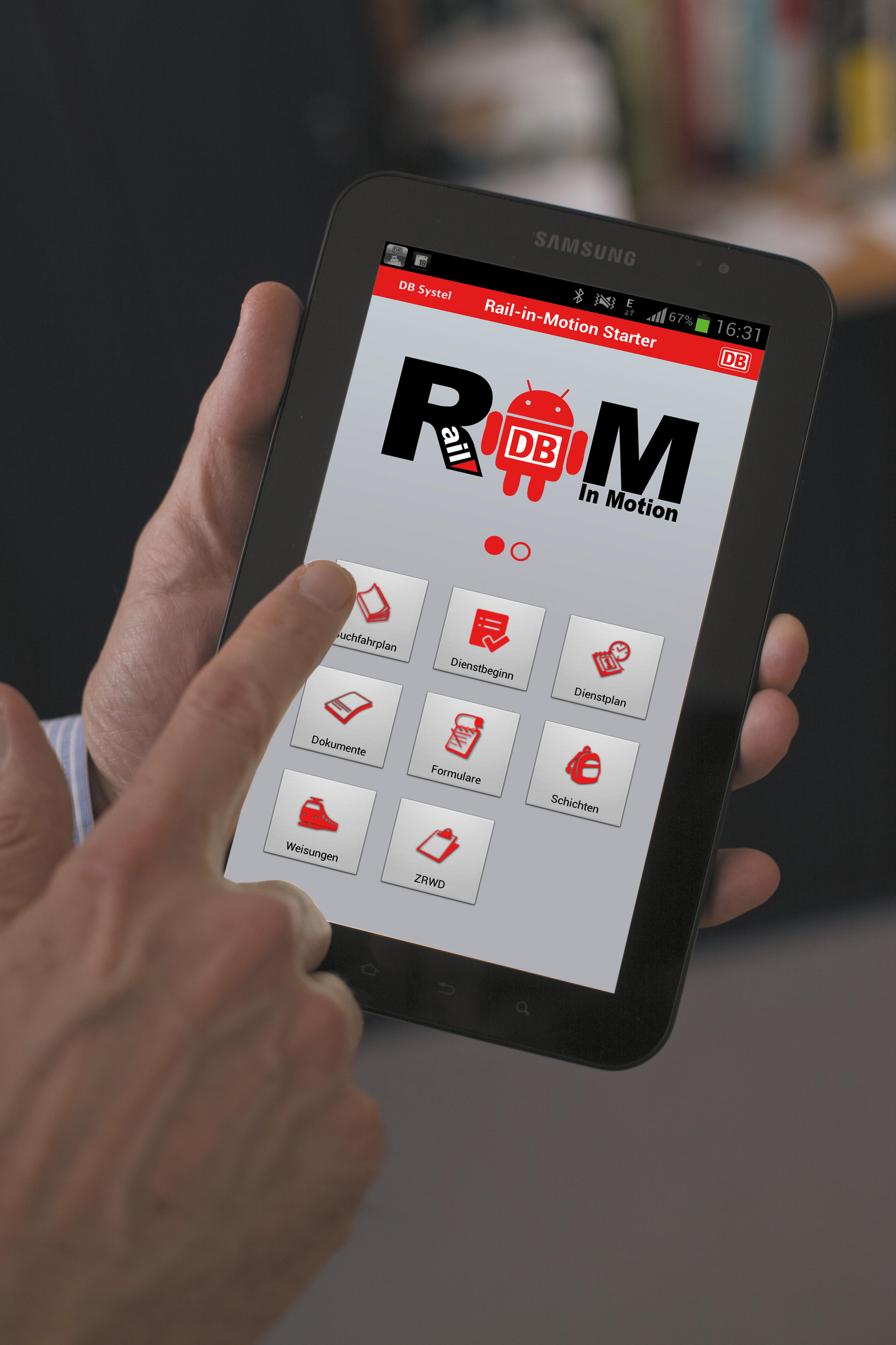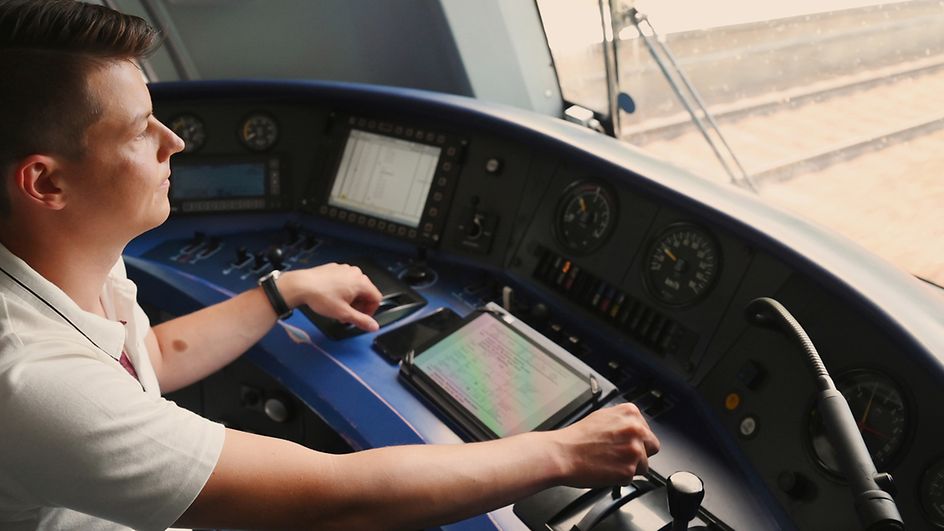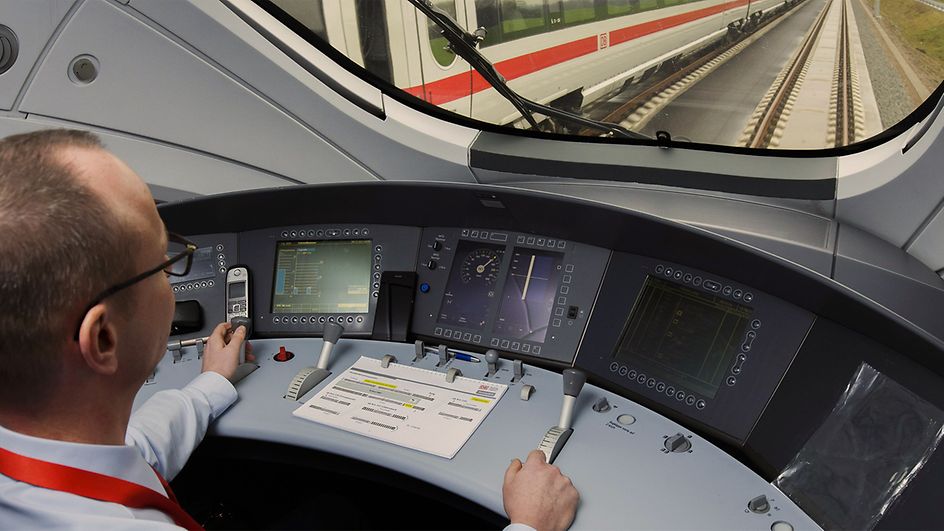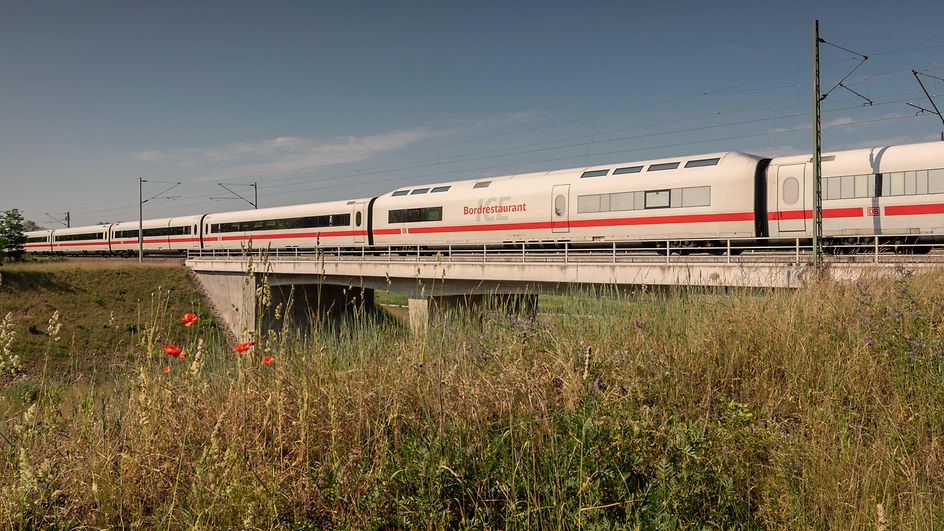Interview
Article: This is how Rail in Motion works in practice
11/2015 - The Rail in Motion product has significantly changed the day to day work of the train driver. We spoke about this subject with a user.
Instead of carrying a stack of paperwork, train drivers today just carry a tablet PC into the cab. Installed on this tablet is the Rail in Motion (RiM) solution with various apps that, among other things, free the user from a mountain of paperwork. The RiM contains, for example, the digital train portfolio, in which all documents are loaded that are required for use in the driver’s cab.
At present, DB Schenker Rail as well as DB Fernverkehr are relying on the tablet solution and are using the RiM apps in a customer-specific configuration. RiM has demonstrated its adaptability, for example by individually assigning the required documents to the user. By means of a mobile phone connection or WLAN, key information can be made immediately available. But does RiM really make life easier for the driver? Benjamin Günther (34) is a train driver at DB Fernverkehr and explains how RiM is proving its worth in everyday use.

How much has your work changed since the introduction of the tablet PC?BENJAMIN GÜNTHER: Quite a lot, actually. Much less paper documentation to lug around, and it certainly makes my rucksack lighter. Sometimes I used to have to carry a second rucksack or an additional bag. That’s now no longer necessary. Sometimes I have to look up instructions or regulations there and then, so I always had to carry them with me. Now, if necessary, I can simply search for the document or download it from the database.
Was the changeover difficult or has the tablet proved easy to use on an everyday basis?BENJAMIN GÜNTHER: For me personally it was no problem. After all, I grew up with computers and more recently with smartphones and tablets. For some of my workmates, however, it was quite a bit more difficult – depending on their existing knowledge.
How actively were attempts made to remove existing obstacles?BENJAMIN GÜNTHER: A lot of different things have been done. Instructors convey the knowledge, group leaders act as contacts. Anyone who needs help, gets it. In addition, there are frequently asked questions and a box for suggestions or complaints. The FAQs are adapted according to the most common problems. Colleagues also help each other; after all, we are all train drivers and do not want to leave each other in the lurch. Sometimes, articles are created in this way in the driver portal (internet platform for DB drivers), for which I am deputy chief editor for long-distance transportation, and they go into more detail than was possible in the introduction to the RiM apps. Since the pilot phase there have also been reports about the tablet and the RiM apps in articles and special issues of the “Tf Aktuell” employees’ newsletter.
Did you have any fears before the changeover?BENJAMIN GÜNTHER: There were no real fears as far as I was concerned, no. But there was a worry that the times specified for performing certain tasks would be reduced. But as yet that has not happened. And we have been promised that it will not happen either.
How quickly did you get used to the app?BENJAMIN GÜNTHER: For me it was pretty quick, but like any app, it does take a certain amount of time to get used to. Minor difficulties can be traced in some cases to the organisation of the documents, rather than the functionality of the RiM apps. For example, some documents have been assigned by the editors to categories that you would not necessarily expect to find them in. And that of course makes them harder to find.

How reliable are the devices and the apps in everyday use?BENJAMIN GÜNTHER: So far, the RiM apps have never crashed on my tablet. Sometimes, however, they take up more RAM which makes the tablet run a bit slower after a while. But if you delete all the temporary files via the RiM menu, you are soon back up to speed. The battery life of the device, however, is not very long, so it would be nice to have a higher powered device.
Are you allowed to put personal content on the tablet, or are there restrictions for security or other reasons?BENJAMIN GÜNTHER: No, no restrictions, we are allowed to use the tablet for private purposes as well. There should be no safety-related issues, for example, from apps that are categorised as safety-critical. Of course, the tablet’s readiness for professional use must be guaranteed at all times. I personally use it to check my e-mails and sometimes surf the internet during breaks. But I hardly ever use it in my leisure time.
Did the introduction of the tablets lead to a sort of compulsion to be reachable?BENJAMIN GÜNTHER: Not for me personally, no. There may be some co-workers who feel that they constantly have to download documents – but that is definitely not the case for me. At most, I will refer to it at the end of a long holiday. But even that is the exception. I don’t have to do that.
Are the interactive options of apps used, or is the tablet first and foremost a one-way device?BENJAMIN GÜNTHER: At the moment it is not particularly interactive. There is an option, however, of actively downloading emergency timetables and searching for documents in databases. There will soon also be an extension to the RiM app deployment schedule, with which duty rosters and work orders can be directly imported.
Does the tablet ever disturb you at work, for example, due to incoming mail?BENJAMIN GÜNTHER: Sometimes yes, but it’s more a problem of available space. The driver’s desk is not exactly designed for the tablet, so actually some sort of holder would be a good idea, like a suction pad or docking station. If additional documentation such as the thick emergency and diversion timetables are on the desk, you don’t know where to put it all. But it used to be even worse with the mountains of paper.
So have the tablets given you greater flexibility in your everyday work?BENJAMIN GÜNTHER: Timetable instructions are now sent to us by RiM, for example. Previously, that was only possible by fax, which then had to be fetched or handed over by a “messenger”. So this has simplified and speeded up communication.
Are you looking forward to other ways in which the tablets could simplify your work?BENJAMIN GÜNTHER: Yes, of course, wherever it makes sense. The more processes that can be simplified by the tablets, the better, as far as I’m concerned. I can’t wait to see what else will come along in future.
Do you have you any suggestions for improvements?BENJAMIN GÜNTHER: It would be really great if there were a simple and convenient way to import documents into the RiM app. We have lists of tips that the drivers nickname “lazy bones’ notes”. On this, we record the key information about stations, routes and the like – even the bakers who offer discounts for railway workers. If these documents could be imported directly into the RiM, it would be a great help in our everyday work. And a “Favourites” function for the RiM app train portfolio would be great.


